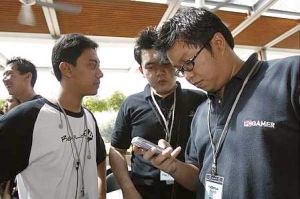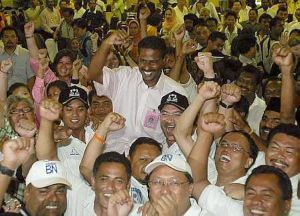Permatang Berangan assemblyman Shabudin Yahaya and Sungai Dua assemblyman Datuk Jasmin Mohamed, two political unknowns outside the state, made it to the national pages last week for their warped remarks on women’s dressing.
The two Umno politicians suggested there should be a dress code for women, blaming women’s provocative dressing for sexual crimes.
The women’s dressing menggoda (seduces) and mencabar (challenges) men, Shabudin was quoted as saying when debating at the state assembly. He said men were sure to look when sexily attired women walked by them.
Hello, what’s wrong with these lawmakers? Malaysians are used to hearing such remarks from conservative PAS politicians in Kelantan, with an eye on the religious and political sentiments of their electorate, but for them to come from the Barisan in a multi-ethnic and multi-religious set-up in Penang is another matter.
In December last year, the Kota Baru Municipal Council also announced that women working in retail outlets and restaurants would be fined if they were not decently dressed, referring to tight-fitting blouses, jeans, shorts and skirts.
The council warned that those arrested could be fined up to RM500. That was the latest ruling in a state where a top PAS leader once said the state government would not hire attractive women.
The PAS government has continued with its policy of gender segregation at supermarket check-outs and no lights out during screening of shows in cinemas. The gender segregation also continues at concerts, which older PAS politicians continue to frown on.
But Mansor Musa (BN-Batu Maung) rightly put the two assemblymen in their place for their sexist remarks, saying they were not showing a good example of the House.
Tan Cheng Liang (BN-Jawi) also ticked them off, saying “even women who are covered from head to toe and two-year-old children have become rape victims. This shows that it has nothing to do with women’s dressing.”
The arguments put up by Shabudin and Jasmin are completely flawed because there are plenty of sex crimes committed against women in rural areas, including east coast states, where the victims were conservatively dressed. Even grandmothers in tudung have been raped.
It is acceptable, even expected, of men to look at sexily dressed women or attractive women, but in a civilised society, we are expected to restrain ourselves. That separates Malaysia from some Middle East countries where even their conservatively dressed women are often subjected to sexual harassment, even attacks.
Malaysian women travellers to some Middle East countries have often talked about having their buttocks pinched by men, who seem unable to control their urges.
It is simply shameful because our women, understanding the culture and sensitiveness of these countries, had taken steps to dress decently but that was even not enough to stop such despicable acts.
Malaysians must be wondering what Jasmin was talking about when he said that women who dressed provocatively had also forgotten their family responsibilities.
What kind of an argument is that? There are plenty of men of all races and religion who have failed to pay their alimonies and maintenance to their ex-wives. That is surely failing to fulfil family commitments, and nothing to do with how women dress.
Politicians like Shabudin and Jasmin – and not forgetting Datuk Bung Mokhtar Radin (BN-Kinabatangan) and Datuk Mohd Said Yusuf (BN-Jasin) – are really wasting taxpayers’ money when they make such remarks in Parliament and state assembly debates.
They may think it is humorous and a way to make the headlines but Malaysians expect better quality debate from our legislators. To put it bluntly, they are making fools of themselves and we do not find it funny at all when we have to pay their allowances for their presence.
When such remarks are made, it would also have an impact on the mindset of some people, reinforcing such prejudices against women.
Malaysians want to hear from our politicians how they have helped women, especially single mothers, to be entrepreneurs and how they can be trained to be computer literate, similar to the successful programme in South Korea. When mothers are good with computers, they can impart their knowledge to their children before they even attend school.
If they believe so strongly in the dignity of women, we would like to hear from the likes of Bung Mokhtar and Shabudin Yahaya how they can help our women – who are our grandmothers, mothers, sisters and daughters.







